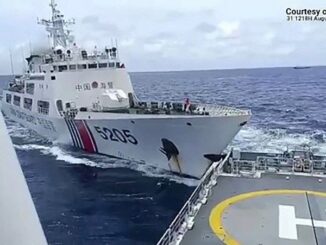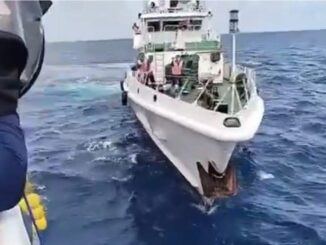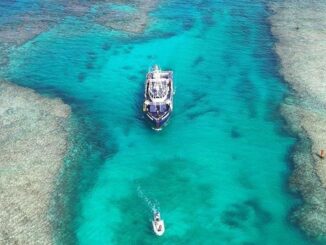
The Philippines on Tuesday rejected China’s accusation that BRP Sierra Madre, its grounded warship on Ayungin Shoal in the West Philippine Sea, had damaged the coral reef ecosystem in the area, describing it as “false” and “classic misdirection.”
In a statement, National Task Force – West Philippines Sea (NTF-WPS) spokesperson Jonathan Malaya pointed out that it is China which has been found to have caused damage to corals.
“The accusation against the Philippines by so-called ‘Chinese experts’ is false and a classic misdirection,” Malaya said.
“It is China who has been found to have caused irreparable damage to corals. It is China that has caused untold damage to the maritime environment, and jeopardized the natural habitat and the livelihood of thousands of Filipino fisherfolk,” he added.
Chinese state-owned media Global Times on Monday reported that Chinese experts found out that BRP Sierra Madre caused damage to the coral reefs and environmental pollution in the South China Sea (SCS).
“Experts who participated in the field survey told the Global Times that solid evidence and scientific analysis showed that the vessel’s grounding process, heavy metal precipitation caused by the ship’s corrosion, and the discharge of garbage and sewage from the personnel on the vessel have had a long-term hazardous impact on the health of corals,” Global Times reported.
“As the Philippines intensified its cognitive warfare against China, the report revealed the truth clearly that it is the Philippines’ grounded military vessel at Ren’ai Jiao that is causing significant harm to the marine environment, they stressed,” it added.
Citing the Permanent Court of Arbitration in 2016, Malaya said China’s construction of an artificial island damaged the Panganiban Reef. He added that China is building more artificial islands with some West Philippine Sea features, adn that these artificial islands now serve as Chinese military bases.
The Arbitral Tribunal found that Chinese authorities were aware that their fishers were harvesting endangered sea turtles, coral, and giant clams on a substantial scale in the South China Sea, Malaya said.
China authorities had not fulfilled their obligations to stop such activities even though their methods cause severe damage to the coral reef environment of the sea, he added.
Citing a 2023 report from independent non-profit organization Center for Strategic International Studies (CSIS), Malaya said 75% of the damage caused by island-building activities in the SCS was done by China.
Another 16,353 acres of coral reef were damaged due to Chinese fishermen’s giant clam harvesting, he said. Aside from this, 4,648 acres of reef were buried due to China’s dredging and landfill, he added.
“The Philippines has also collated evidence that China has been responsible for severe damage to corals in Bajo de Masinloc, Rozul Reef, Escoda Shoal, Sabina Shoal, and Pag-asa Cays 1, 2, and 3, among others,” Malaya said.
“The swarming and indiscriminate, illegal fishing activities of Chinese Maritime Militia (CMM) in these areas have severely degraded the marine environment in the WPS,” he added.
Malaya warned the public and the international community of China’s efforts to spread fake news and disinformation against the Philippines as he called for an independent marine scientific assessment in the WPS.
“We also call for an independent, third party marine scientific assessment in the WPS by impartial recognized experts—using underwater surveys, collated satellite imagery, photo and video references, and other scientific means to establish the causes of coral reef damages and other recorded destruction of the maritime environment in the WPS,” Malaya said.
“We invite other Indo-Pacific nations to join the Philippines in pushing for a more united, coordinated, and sustained multilateral action to protect and preserve the marine and land biodiversity in our region.”
Ayungin Shoal or Ren’ai Reef is a submerged reef in the Spratly Islands.
READ: EXPLAINER: What is the Ayungin Shoal and why is it important?
It is located 105 nautical miles west of Palawan and is within the Philippines 200-mile exclusive economic zone (EEZ).
Beijing claims almost the entire SCS, a conduit for more than $3 trillion in annual ship commerce. Its territorial claims overlap with those of the Philippines, Vietnam, Malaysia, and Brunei.
Manila refers parts of the waters within its exclusive economic zone as the West Philippine Sea. —KBK, GMA Integrated News





Be the first to comment